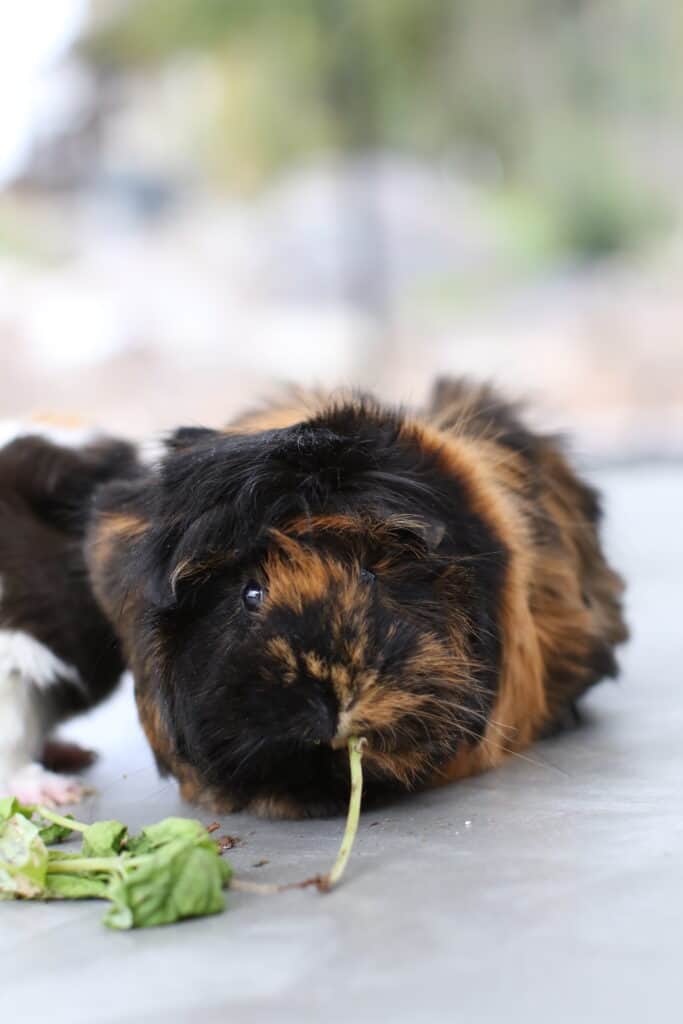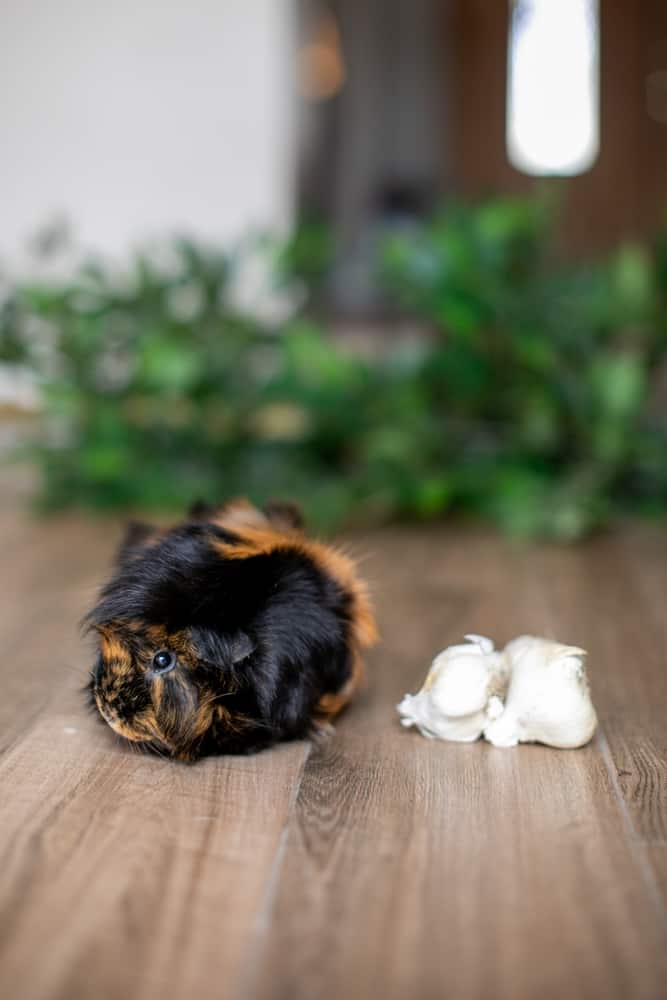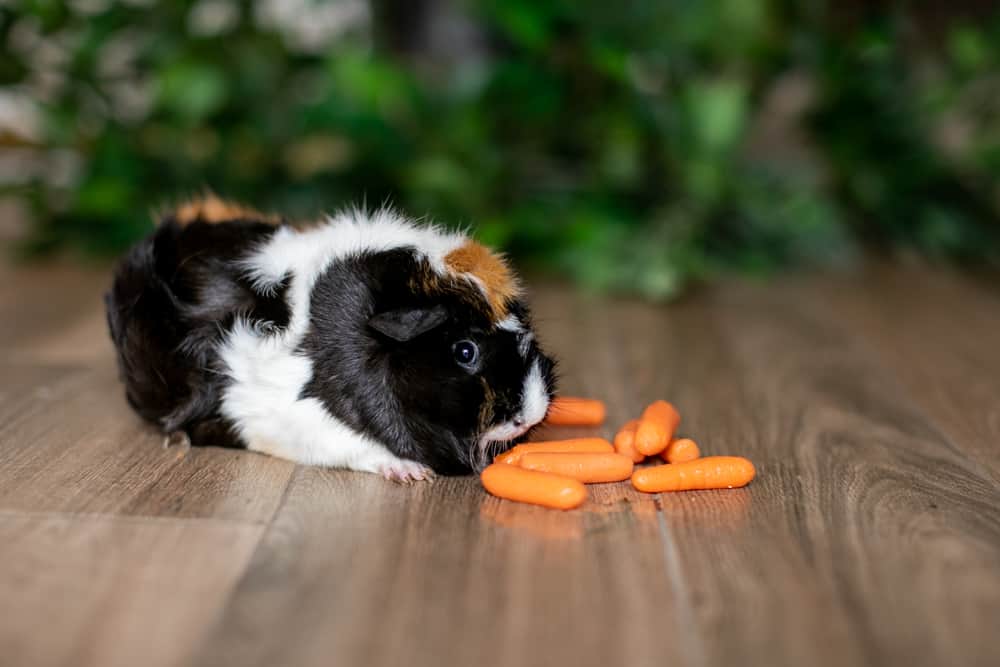As an Amazon Associate we earn from qualifying purchases.
Have you ever seen your guinea pig dipping his head between his hind legs, then coming up for air while nibbling on something? If yes, then you must be wondering what on earth is your guinea pig doing?! Do guinea pigs eat their poop? While this may seem disturbing to you, it is quite normal for some animals.
Do Guinea Pigs Eat Their Poop?
Yes, guinea pigs occasionally consume their own poop, a practice known as coprophagy. So, if you notice your guinea pig doing this, don’t be alarmed; it’s perfectly natural and shouldn’t be stopped.
This may seem unfathomable to us, but guinea pig excrement helps enhance the digestion process in their bodies, and it is a natural guinea pig action.

Guinea pig feces are even healthy for them to ingest. It appears illogical, doesn’t it? That is correct; your guinea pig may freely swallow its own excrement.
What Is Coprophagy?
Don’t worry if you have heard this term for the very first time. In the simplest terms, coprophagy is the eating of the feces.
Basically, animals such as guinea pigs, chinchillas, hamsters, and rabbits are unable to properly chew or digest the fibrous food that they typically rely on, resulting in pellets that are still high in critical vitamins and minerals that your guinea will need to consume again to benefit from so they eat their poop!
Understanding the Types of Poops Guinea Pigs Produce
Guinea pigs produce two types of excrement: caecals (also known as caecotrophs) and normal poop. The normal droppings are the regular dark brown excrement that is solid. These droppings may be found all around the cage and on the hay.
Caecals are softer, lighter in color, and sticky (almost like mucus). They also include nutrients that your piggie’s body did not absorb. Caecals are rarely seen since pigs consume them directly from their bottoms.
So, when you see your piggies dipping down between their rear legs and popping up chewing, it’s because they’re eating their caecals. They do this around 150-200 times every day.

Nutritional Benefits of Coprophagy
Because plant matter is not entirely digested the first time it is consumed, these cecotropes are rich in essential nutrients. They include numerous vital vitamins, including vitamin K, and nearly twice the protein and half the fiber of typical brown excrement. Because of the decreased fiber level, the nutrients are more easily absorbed.
Additionally, vitamin K is also present in fruits such as raspberries.
Cecotropes also contain helpful bacteria that are necessary for the health of a guinea’s intestinal flora, and they can aid other ill guineas by restoring their gut biome. In fact, ill guineas have been observed stealing cecotropes off their friends’ bottoms!
Related Questions
Since the procedure is quite confusing to understand, we are sure you must have a lot going in your head. Don’t worry! We have got you covered.
How Often Do Guinea Pigs Poop?
The frequency with which a guinea pig practices potty visiting varies depending on many factors. The average adult sheds as few 0-3 droppings per day while babies may produce 100 or more!
The type and quality of hay your pet eats could impact the frequency in which it goes potty; diet may also play a role here since less protein means fewer bulkier stools! Additionally, older animals tend to poop more than younger ones as well.
What if My Guinea Pig Doesn’t Eat Its Poop?
If your guinea pigs don’t (or can’t) consume their caecals, you’ll end up with an ill, malnourished guinea pig. Something isn’t right if you find your piggies aren’t eating their caecals. There might be a lot of underlying health issues preventing them, such as:
- Arthritis
- Ear infection
- Impaction
- Dental problems
- Obesity
So if you see a large number of caecals suddenly emerging in your piggie’s cage, you need to take your pet to the vet.

When Do Guinea Pigs Eat Each Other’s Poop?
If piggies are unable to access their own caecals, they will do the next best thing and take some from another guinea pig. Piggies naturally understand that caecals are beneficial to their health. Sick pets will consume the caecals of healthy guinea pigs if they are unable to produce their own.
This is done to keep their digestive system in good working order.
What Causes My Guinea Pig to Poop So Much?
Guinea pigs defecate a lot, which is very natural. They have a rapid digestive system and will excrete as much as they consume. Pooping frequently indicates that your guinea pig is healthy.
Moreover, vegetables that have antioxidants like celery can help assist in food digestion. Unlike crackers that may give digestive problems and weight issues to your guinea pigs.
Conclusion
Guinea pigs eating their own dung is not only normal and natural, but it is also necessary for their health. Many tiny mammals engage in the same behavior, and there is even more cause to be concerned if they are not eating their feces! When you witness your guinea eating its excrement, you may relax knowing that they are healthy, happy, and engaging in totally normal behavior.